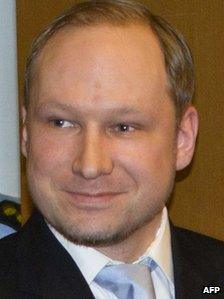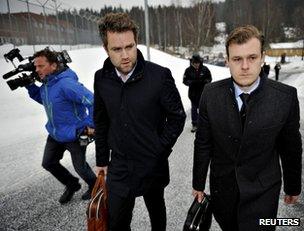Norway attacks: Breivik charged with terror attacks
- Published

Breivik made a court appearance in Oslo in February
Anders Behring Breivik, who confessed to attacks which left 77 people dead and 242 injured in Norway, has been charged with terror acts.
Defence lawyers went to his prison near the capital, Oslo, to present their client with the charges.
Prosecutors have indicated they consider Breivik mentally ill and will seek to have him committed to psychiatric care rather than jailed.
Breivik is expected to go on trial on 16 April.
He has been charged under a paragraph in Norway's anti-terror law that refers to violent acts intended to disrupt key government functions or spread fears in the population.
"The defendant has committed highly serious crimes of a dimension we have no previous experience with in our society in modern times," prosecutor Svein Holden told reporters in Oslo.
'Totally calm'
Speaking outside Breivik's prison, police spokesman Tore Jo Nielsen said the killer had reacted calmly as the charges were read out.
"The whole reading-of-the-charges process was very calm and it took place in a small room where we were sitting with the accused and I can now confirm that the charges have been read to him..." he said.
"He was totally calm."
If convicted, Breivik faces a maximum penalty of 21 years in prison.

Breivik's defence lawyers went to his prison to present the charges
The prosecution said last week it was prepared to accept Breivik was criminally insane and therefore not responsible for his acts, and as such it might not call for a prison sentence.
However, it reserved the right to alter that view if new elements emerged about his mental health by the end of the trial.
"The way the case appears at the time the charges are being brought, there is no basis to request a regular prison penalty," state prosecutor Tor-Aksel Busch wrote in instructions to prosecutors handling the case.
"But it must be clear in the charge sheet that the prosecution reserves the right, during the trial, to request a prison punishment or containment lasting 21 years, based on the complete evidence shown to the court."
Medical experts have been divided over Breivik's state of mind.
A first analysis by court-appointed psychiatrists last year found that he was insane, on the basis of 13 interviews with the prisoner.
Their report said Breivik lived in his "own delusional universe where all his thoughts and acts are guided by his delusions".
However, four psychiatrists who subsequently assessed Breivik disagreed with several of their court-appointed colleagues' conclusions.
In findings revealed in January, they argued that Breivik was neither psychotic nor schizophrenic and said they did not think he needed drugs.
A second court-ordered psychiatric evaluation of Breivik is currently under way.
Breivik's lead lawyer, Geir Lippestad, said the potential for conflicting psychiatric findings complicated the defence.
"We will have to prepare two lines [of defence] - both for sanity and insanity," he told broadcaster TV2.
Teenage victims
The attacks on 22 July last year were the worst act of violence Norway has seen since World War II, and have had a profound impact there.
Breivik disguised himself as a police officer to plant a car bomb that exploded close to government offices in Oslo, killing eight people and wounding 209.
Still in uniform, he then drove to the island of Utoeya, where a summer youth camp of Norway's governing Labour Party was being held.
In a shooting spree that lasted more than an hour, he killed 67 people - mostly teenagers - and wounded 33, while a further two people died falling or drowning.
Thirty-four of the dead were aged between 14 and 17, 22 between 18 and 20, six between 21 and 25, and seven older than 25, said prosecutor Inga Bejer Engh.
Earlier casualty reports had spoken of 151 people wounded.
According to prosecutors, nearly 900 people were affected by the twin attacks - 325 in Oslo and 564 on the island of Utoeya.
Only those killed or seriously injured, a total of 119 people, will be named at the trial.
Tove Selbekk, a member of a support group, welcomed the indictment but said many survivors and families of victims were dreading the start of the trial.
"We're very clear on the fact that it will be tough... to hear him explain himself and to hear about all those who passed away and how they passed away,'' he said.
"But this is something we need to go through.''
Trond Henry Blattmann, who lost a son in the massacre, told AFP News agency: "The penalty handed to this man will never be enough in our eyes.
"The most important thing for us is, we hope, that he will never again set foot in Norwegian society."
Breivik has said his attacks were atrocious but necessary for his campaign to defend Europe against a Muslim invasion.
Investigators have found no evidence to support his claims that he belongs to a secret "resistance" movement.